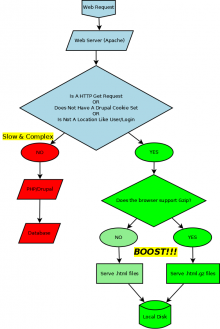Yes, Drupal 8 is slower than Drupal 7 - here's why
tl;dr: Drupal 8's defaults make most Drupal sites perform faster than equivalent Drupal 7 sites, so be wary of benchmarks which tell you Drupal 7 is faster based solely on installation defaults or raw PHP execution speed. Architectural changes have made Drupal's codebase slightly slower in some ways, but the same changes make the overall experience of using Drupal and browsing a Drupal 8 site much faster.
When some people see reports of Drupal 8 being 'dramatically' slower than Drupal 7, they wonder why, and they also use this performance change as ammunition against some of the major architectural changes that were made during Drupal 8's development cycle.
First, I wanted to give some more concrete data behind why Drupal 8 is slower (specifically, what kinds of things does Drupal 8 do that make it take longer per request than Drupal 7 on an otherwise-identical system), and also why this might or might not make any difference in your choice to upgrade to Drupal 8 sooner rather than later.
 I'm a huge fan of
I'm a huge fan of